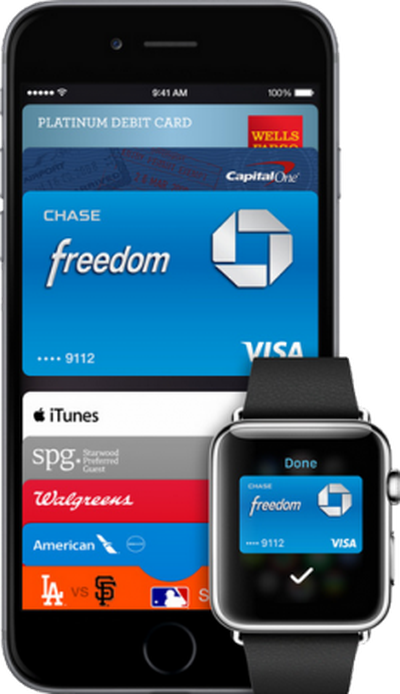Apple Pay Gains 18 New Participating Issuers in United States
 Apple updated its Apple Pay participating issuers list today with 18 additional banks, credit unions and financial institutions supporting the contactless payment service in the United States. Apple Pay now has over 400 participating issuers nationwide, and several more plan to support the NFC-based mobile payment service in the future.
Apple updated its Apple Pay participating issuers list today with 18 additional banks, credit unions and financial institutions supporting the contactless payment service in the United States. Apple Pay now has over 400 participating issuers nationwide, and several more plan to support the NFC-based mobile payment service in the future.
The newly added Apple Pay participating issuers are reflected below, although it's worth noting that some banks, credit unions and financial institutions listed may have already had support for the contactless payments service and are only now being reflected on Apple's website.
The full list of new Apple Pay participating issuers:
- Arlington Community Federal Credit Union
- Bank of Idaho
- BankFirst
- Charter Bank
- Community Bank
- Community Bank of Oak Park River Forest
- Corporate America Family CU
- Credit Union of New Jersey
- Del Norte Credit Union
- Empower FCU
- FORUM Credit Union
- Gesa Credit Union
- Institution for Savings
- Mid-Missouri Bank
- Owen County State Bank
- Pacific Service Credit Union
- Statewide Credit Union
- Vinton County National Bank
Apple Pay remains limited to the United States and United Kingdom, although Apple is committed to an international rollout of the mobile payments service in additional countries such as Canada and China in the future. The Wall Street Journal previously reported that Apple is planning a November launch of Apple Pay in Canada.
Popular Stories
The long wait for an Apple Watch Ultra 3 appears to be nearly over, and it is rumored to feature both satellite connectivity and 5G support.
Apple Watch Ultra's existing Night Mode
In his latest Power On newsletter, Bloomberg's Mark Gurman said that the Apple Watch Ultra 3 is on track to launch this year with "significant" new features, including satellite connectivity, which would let you...
The iPhone 17 Pro Max will feature the biggest ever battery in an iPhone, according to the Weibo leaker known as "Instant Digital."
In a new post, the leaker listed the battery capacities of the iPhone 11 Pro Max through to the iPhone 16 Pro Max, and added that the iPhone 17 Pro Max will feature a battery capacity of 5,000mAh:
iPhone 11 Pro Max: 3,969mAh
iPhone 12 Pro Max: 3,687mAh...
The upcoming iPhone 17 Pro and iPhone 17 Pro Max are rumored to have a slightly different MagSafe magnet layout compared to existing iPhone models, and a leaked photo has offered a closer look at the supposed new design.
The leaker Majin Bu today shared a photo of alleged MagSafe magnet arrays for third-party iPhone 17 Pro cases. On existing iPhone models with MagSafe, the magnets form a...
iOS 26 and iPadOS 26 add a smaller yet useful Wi-Fi feature to iPhones and iPads.
As spotted by Creative Strategies analyst Max Weinbach, sign-in details for captive Wi-Fi networks are now synced across iPhones and iPads running iOS 26 and iPadOS 26. For example, while Weinbach was staying at a Hilton hotel, his iPhone prompted him to fill in Wi-Fi details from his iPad that was already...
Apple's position as the dominant force in the global true wireless stereo (TWS) earbud market is expected to continue through 2025, according to Counterpoint Research.
The forecast outlines a 3% year-over-year increase in global TWS unit shipments for 2025, signaling a transition from rapid growth to a more mature phase for the category. While Apple is set to remain the leading brand by...
Apple today seeded the second betas of upcoming iOS 18.6 and iPadOS 18.6 updates to public beta testers, with the betas coming just a day after Apple provided the betas to developers. Apple has also released a second beta of macOS Sequoia 15.6.
Testers who have signed up for beta updates through Apple's beta site can download iOS 18.6 and iPadOS 18.6 from the Settings app on a compatible...
AppleInsider's Marko Zivkovic today shared a list of alleged identifiers for future Mac models, which should roll out over the next year or so.
The report does not reveal anything too surprising, but it does serve as further evidence that Apple is seemingly working on new models of every Mac, including the MacBook Air, MacBook Pro, iMac, Mac mini, Mac Studio, and Mac Pro.
Apple is...
 Apple updated its Apple Pay participating issuers list today with 18 additional banks, credit unions and financial institutions supporting the contactless payment service in the United States. Apple Pay now has over 400 participating issuers nationwide, and several more plan to support the NFC-based mobile payment service in the future.
Apple updated its Apple Pay participating issuers list today with 18 additional banks, credit unions and financial institutions supporting the contactless payment service in the United States. Apple Pay now has over 400 participating issuers nationwide, and several more plan to support the NFC-based mobile payment service in the future.


















